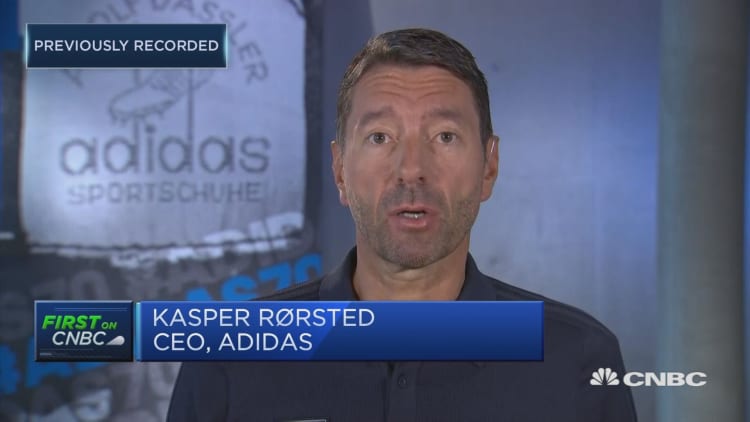
German sportswear company Adidas reported disappointing second-quarter sales on Thursday but confirmed it expects a recovery in the second half after it stemmed a decline in Europe and saw its long-struggling Reebok brand recover.
Adidas shares, which had rallied in recent weeks on hopes it might lift its outlook — particularly after German rival Puma raised its sales and profit forecasts — slipped over 1% in early morning deals.
Second-quarter sales rose a currency-adjusted 4% to 5.51 billion euros ($6.18 billion), slightly shy of average analyst forecasts for 5.54 billion as the company saw a strong fall in the soccer category a year on from the World Cup.
"We are going to see a pick up in the third and the fourth quarter because that is where we are going to have a lesser impact on our supply chain. So, we are very satisfied with the results," Adidas CEO Kasper Rorsted told CNBC's "Squawk Box Europe" on Thursday.
"We continue to deliver upon what we promised the market," he added.
Reebok turnaround plan
Adidas had already warned in March that supply chain issues would hit sales growth in the first half, citing particular problems meeting North America demand for mid-market clothing.
The company said it was confident sales would accelerate in the second half, allowing it to confirm a full-year outlook for currency-neutral sales growth of 5-8% and net income from continuing operations of between 1.88 and 1.95 billion euros.
Quarterly net profit from continuing operations rose 10% to 462 million, helped by another quarter of strong growth for ecommerce, where sales rose 37%.
Margins are higher for online sales than wholesale.
Reebok sales rose 3%, driven by the popularity of retro styles, particularly in North America, where the brand expanded 10%, and in emerging markets.
"Of course, we are very happy to see that Reebok came back to growth in the second quarter, but we have got to see a sustainable growth rate," Rorsted said.
Group sales were flat in Europe, recovering from a 3% fall in the first quarter after Adidas took steps to reduce its reliance on its Originals fashion line and boost sales of sports performance gear, with new product launches.
Currency war concerns
When asked whether increased costs as a result of a tit-for-tat tariff dispute between Washington and Beijing could be passed on to consumers over the coming months, Rorsted replied: "For us, we still see very little impact for the consumer."
"What I'm much more concerned about is, of course, the currency war that is going on with the potential weakening of the RMB (Chinese yuan)."
China's central bank on Thursday set the official reference rate for the Chinese currency at 7.0039 yuan per dollar — the weakest level since April 21, 2008. A drop in a currency's value makes that country's products cheaper on the international market.
Investors are watching the currency closely after the currency breached the important 7-yuan-per-dollar level on Monday. It prompted the U.S. Treasury department to label Beijing a currency manipulator.
Rorsted said the prospect of China weakening its currency could have a "significant impact" on the firm's results because it has 25% of its business based in China in local currency.
"In my opinion, (entering into a currency war) would have no winners. That is going to be a lose-for-all for companies and for regions."

